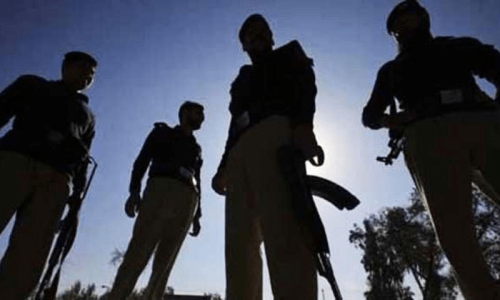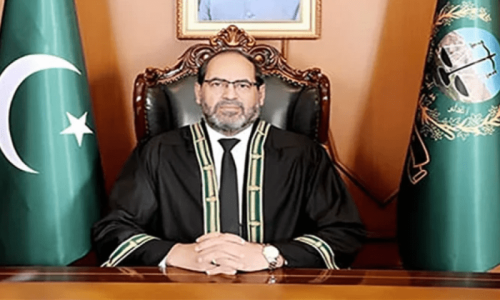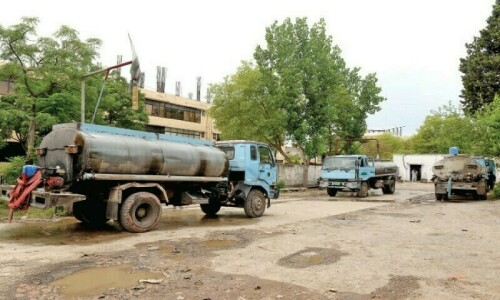WASHINGTON, Dec 16: Key members of the US establishment — from Secretary of State to the national intelligence chief — are now backing claims that the Taliban have set up safe havens along the Pakistan-Afghan border.
Secretary Condoleezza Rice acknowledged the existence of Taliban’s ‘safe havens’ in an interview she gave to the Washington Post earlier this week, urging Pakistan and Afghanistan to work with the coalition forces to destroy them.
The State Department released full text of the interview, containing her comments on the situation along the Pakistan-Afghan border, on Friday evening.
This is the first time that such a senior US official has mentioned the so-called Taliban safe havens in the area. Her statement follows the publication of a series of research papers, newspaper articles and statements by other officials, all blaming Pakistan for allowing these safe havens to function.
On Friday, America's top intelligence officer warned Pakistan that it will soon have to decide what it can do about those tribal leaders who failed to prevent the movement of Taliban and Al Qaeda fighters across the Afghan border.
Such claims have been published repeatedly in the US media since Washington invaded Afghanistan more than five years ago. But the first shot in the latest round was fired by The New York Times which published a 10,000-word article on Afghanistan last week.
In the report, the newspaper claimed the militants had created a “Taliban mini-state” in the tribal zone, vastly expanding their training of suicide bombers and other recruits.
Commenting on this report, State Department spokesman Sean McCormack agreed with a reporter that the situation along the Pakistan-Afghan border was “a mess” but said that “the key is cooperative working relationships among the Afghans, the Pakistanis, as well as coalition forces.”
In her interview to the Post, Ms Rice echoed similar sentiments. She said that a “more concerted effort” will have to be made to prevent this area from becoming a “safe haven” for terrorists. She acknowledged that this was “a very tough” area which has been “ungoverned forever.” But she also said that Pakistan and Afghanistan “are going to have to make and we are going to have to make a more concerted effort to prevent safe havens there.”
Ms Rice recalled that when President Musharraf and his Afghan counterpart met President Bush at the White House in September, they agreed to get the tribes on both sides together.
“They’re trying a lot of things. But I think that probably -- those problems, you know, the lack of an economy, the lack of an infrastructure and the ungoverned areas, are the real challenges,” she said.
On Friday, America’s Director of National Intelligence John D Negroponte said that the government of Pakistan would soon have to decide what it could do about the tribal authorities who have failed to prevent Taliban and Al Qaeda fighters from moving back and forth across the border.
“Sooner or later, the government will have to reckon with it,” he said.
But with elections in Pakistan coming, the United States understands that President Pervez Musharraf "has a domestic political balancing act to perform," he added.
In September, government representatives signed accords with tribal elders in North Waziristan in which those leaders agreed that they would not allow border crossings "for any kind of militancy."
In return, Pakistani army units withdrew from that area. Mr Negroponte said that the "tribal authorities are not living up to the deal" and that back-and-forth travel by the Taliban and others "causes serious problems."
At a recent diplomatic function in Washington, Pakistani diplomats were seen asking journalists what’s causing this “sudden blistering attack” on Pakistan.
Observers say that a combination of domestic and external pressures have suddenly brought Afghanistan in the spotlight. They say that from military and intelligence officials to journalists have all been reporting a sudden increase in Taliban attacks in Afghanistan and the situation has reached a point where the US administration feels that it cannot continue to defend the peace deal Pakistan signed with pro-Taliban tribesmen in North Waziristan.
After the failure of its strategy in Iraq, the Bush administration feels that it cannot afford to fail in Afghanistan as well, the observers argue.
In its report on Iraq, the bipartisan Iraq Study Group warned that Afghanistan’s porous borders could allow the Taliban to “control more of Afghanistan” and should that happen, “it could provide Al Qaeda the political space to conduct terrorist operations.”















































Dear visitor, the comments section is undergoing an overhaul and will return soon.